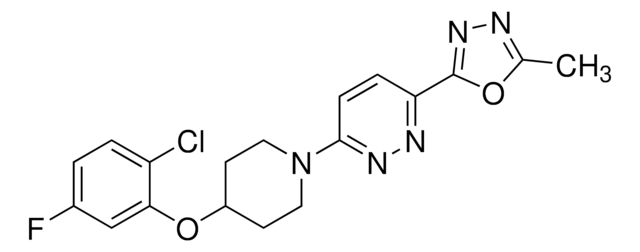C3742
Chk2 Inhibitor II hydrate
≥98% (HPLC)
Sinónimos:
2-(4-(4-Chlorophenoxy)phenyl)-1H-benzimidazole-5-carboxamide hydrate
About This Item
Productos recomendados
Quality Level
assay
≥98% (HPLC)
form
solid
color
off-white to tan
solubility
DMSO: ≥2 mg/mL (warmed)
originator
Johnson & Johnson
storage temp.
2-8°C
SMILES string
O=C(C1=CC=C2C(N=C(C3=CC=C(OC4=CC=C(Cl)C=C4)C=C3)N2)=C1)N
InChI
1S/C20H14ClN3O2/c21-14-4-8-16(9-5-14)26-15-6-1-12(2-7-15)20-23-17-10-3-13(19(22)25)11-18(17)24-20/h1-11H,(H2,22,25)(H,23,24)
InChI key
UXGJAOIJSROTTN-UHFFFAOYSA-N
Gene Information
human ... CHEK2(11200)
Biochem/physiol Actions
Features and Benefits
Storage Class
11 - Combustible Solids
wgk_germany
WGK 3
flash_point_f
Not applicable
flash_point_c
Not applicable
Certificados de análisis (COA)
Busque Certificados de análisis (COA) introduciendo el número de lote del producto. Los números de lote se encuentran en la etiqueta del producto después de las palabras «Lot» o «Batch»
¿Ya tiene este producto?
Encuentre la documentación para los productos que ha comprado recientemente en la Biblioteca de documentos.
Nuestro equipo de científicos tiene experiencia en todas las áreas de investigación: Ciencias de la vida, Ciencia de los materiales, Síntesis química, Cromatografía, Analítica y muchas otras.
Póngase en contacto con el Servicio técnico








